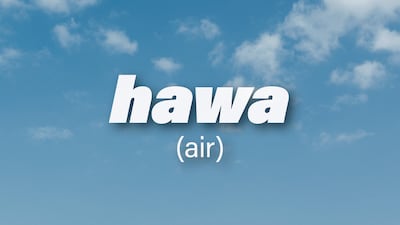Hawa is Arabic for air, or atmosphere.
While the word touches upon the layers of gas that envelop the planet, it also pays tribute to the unifying aspect of the air we breathe and can denote love or even a longing for home.
In her famous song Nassam Alayna El Hawa, Fairuz calls on the wind to sweep her back to her homeland. The song has become an anthem of homesickness among Arabic-speaking diasporic communities and resonates with nostalgia.
Stripping away the sentimental, the hawa of a country can also simply refer to its climate (munakh).
When someone says “fi hawa”, it usually means that there is a light breeze (naseem) or wind (rih) blowing about. When stepping out for some fresh air, you could say beddi itnaffas hawa naqi.
One famous maxim that uses the term is la yualej el nafs afdal min istinshaq al hawa al naqi, or, “nothing heals the spirit better than fresh air”. Hawa mulawath, on the other hand, is polluted air. In its verb form, hawwa means to air out, fan or ventilate.
Hawa also has its place in the lexicon of sweet nothings. You could tell your sweetheart “enta el hawa elli bitnaffaso” or “you are the air I breathe”.
On that note, hawa can mean love or passion. Plenty of popular Arabic songs use the word in that context, including Lebanese singer Yara’s Ah Mennak Ya Hawa and Abdel Halim Hafez’s El Hawa Hawaya and Ahwak.
Like its English counterpart, hawa can be used in a wide range of contexts. For a newscaster, it can mean being live on air. It can refer to something plummeting from above or a predatory bird diving for its prey. It can also be used to depict tall daydreams or castles in the sky (qusoor fil hawa).
Finally, but perhaps most entertainingly, hawa can also be used as an insult. If someone is getting on your nerves or is trying to run one by you, you could tell them to “kol hawa” or eat air, especially if you’re trying to avoid using expletives.
Scroll through the gallery below see The National's pick of Arabic words of the week











































































